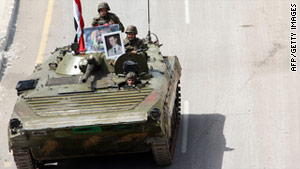 By Catherine E. Shoichet and Joe Sterling, CNN
By Catherine E. Shoichet and Joe Sterling, CNN
(CNN) -- Videos posted online show tanks in Syrian streets, scrambling crowds and the menacing sounds of sniper fire.
On the other side of the world, Syrian-Americans say they are watching in anguish, haunted by what they see and hear.
"You hear people screaming for help, and you can identify the accent," said Yaser Tabbara, a 35-year-old attorney in Chicago who was raised in Syria's capital, Damascus.
"It's been very traumatizing for me and my family to see all these things," he said. "To see all of that, and to know that you can do very little about it from outside Syria, is a very demoralizing and frustrating position to be in."
Word of a brutal crackdown by government security forces began to trickle out soon after anti-government protests began in mid-March. Since then, human rights groups say more than 775 people have been killed.
CNN has not been granted access into Syria and is unable to independently verify those claims, videos posted online or witness accounts.
Syrian-Americans say they also struggle to find out what's happening, frantically searching for news online and calling family and friends in Syria.
"They're too scared. ...They don't say anything on the phone. You really can't. Phones are monitored. Everything's monitored," said Mohammed, an American of Syrian descent who lives in the Chicago area.
He asked that his last name not be used, fearing his extended family in Aleppo, Syria's second largest city, could face repercussions.
"There's a sense of helplessness. We try to bring the attention of the international community to what's going on. That's the only thing Syrian-Americans can do to deal with the problem," said Mohamed T. Khairullah.
The 35-year-old mayor of Prospect Park, New Jersey, wrote an op-ed in his local newspaper, criticizing the "violent repression" of Syrian President Bashar al-Ashad's regime. In Syria, he wrote, people can't speak out at government meetings or write letters to the editor.
"The only thing they can do now is protest peacefully. That protest is being documented via social media for the world to see the atrocities of the Syrian forces," he wrote.
Khairullah said the news has sharply divided the large Arab community in the area where he lives, and many people are still struggling to understand the situation.
"People don't know whether to go with or against (the government), and they don't know what the future might hold," he said.
The members of the Syrian American Club in Washington are also split, according to Munif Atassi, the social club's president.
"I've seen people on either side, and I've seen people in the middle. The majority of people are right in the middle, praying for the conflict to end," said Atassi, 57.
Friends and family he's spoken with in Syria also have divergent opinions, he said.
"Frankly, they don't know what to believe anymore. ... The people I talk to, they believe that there is propaganda and lying coming from both sides," he said.
For weeks, it seemed the world's attention was focused elsewhere, said Hosam Hamadah, 47, of Houston. When he couldn't find enough information about the situation in news reports, the small-business owner said he turned to online social networks.
Now Hamadah is glued to Facebook, searching for updates and posting videos of the violence that he receives from acquaintances in Syria.
Even from thousands of miles away, deciding to speak out about the situation was difficult, he said.
"It took me a while before I made up my mind. Then I realized, if I don't do this and the next guy won't do this, nobody's going to say anything," he said. "Somebody has to say something. Me and my family, we're not better than the people that are getting killed in the streets."




